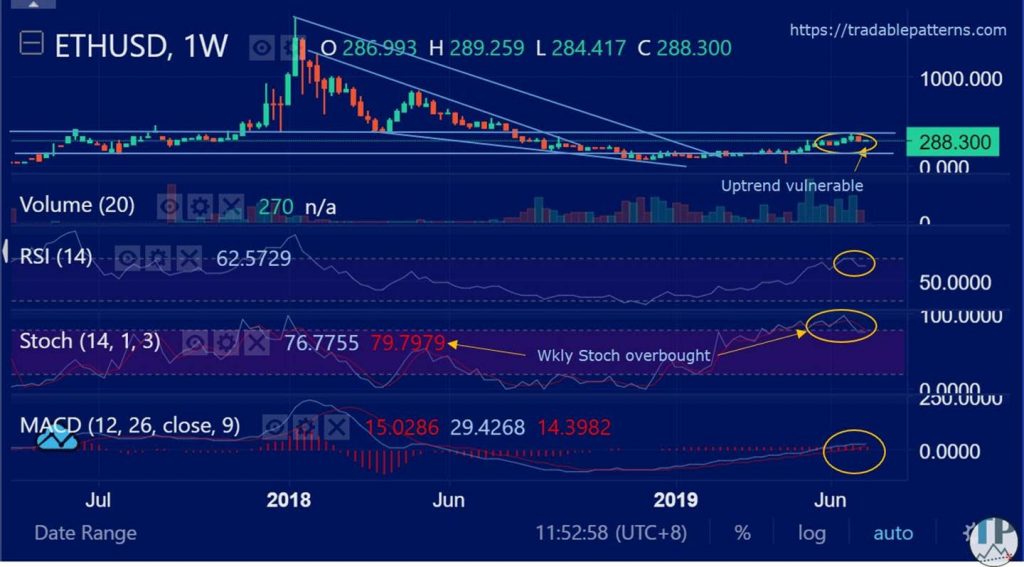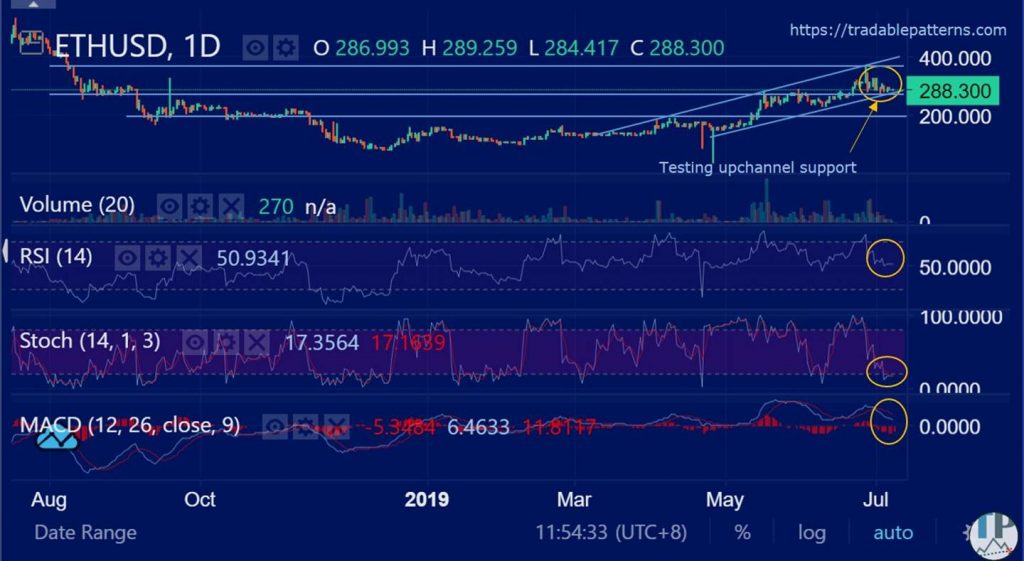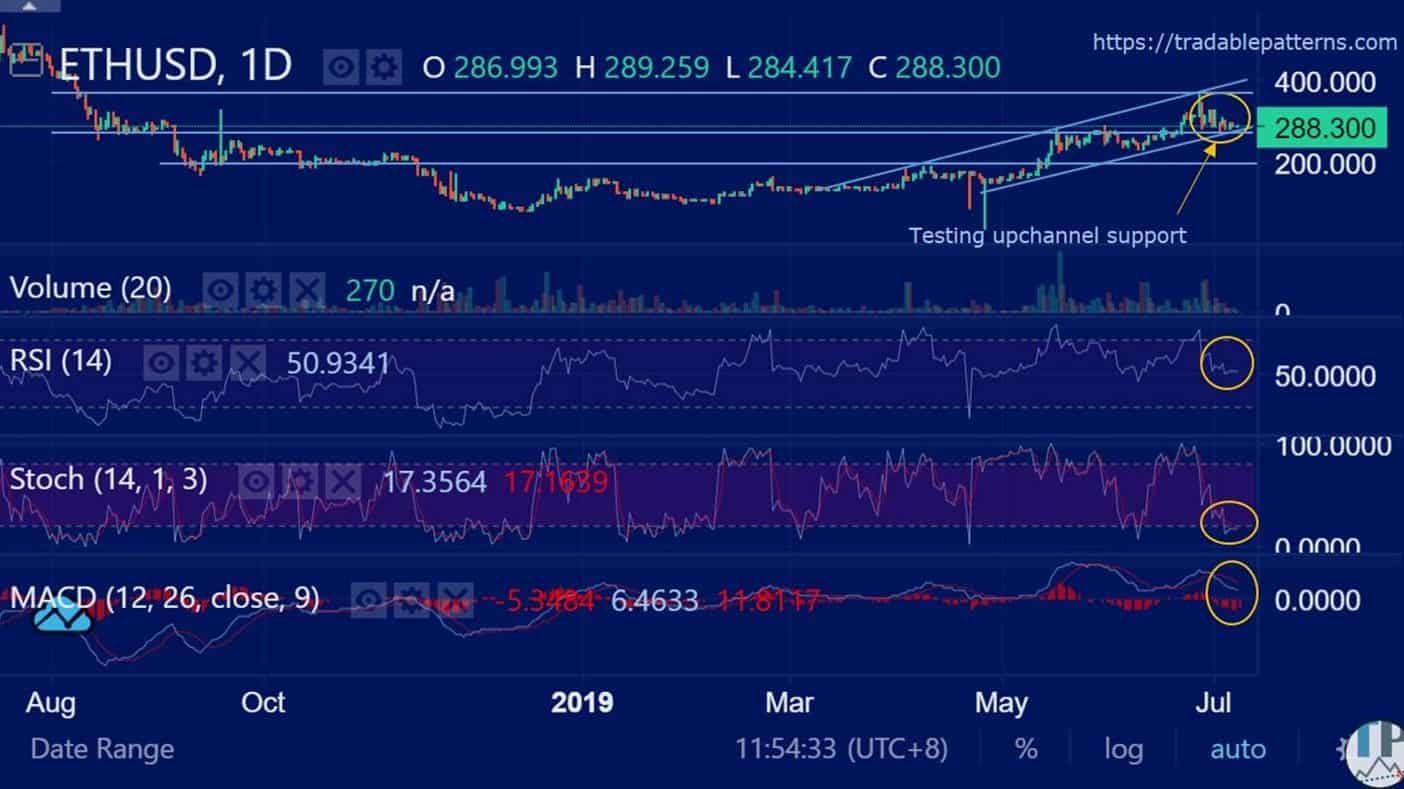Ethereum (ETHUSD) is under pressure as it enters a new week, and currently testing upchannel support (on the daily chart). Bulls should be prepared for a potential break below daily chart upchannel support, where a deeper reversal will likely find initial support at the 38.2% Fib retrace of the May-June bounce. Note that the two breaks below upchannel support (on the daily chart) in April are specific to the Liquid ETHUSD market, due to insufficient liquidity, marketmaker and circuitbreaker support (specifically on this exchange market) and not a spike move down on ETHUSD (across other exchanges markets).
Ethereum Fundamentals
LedgerX and ErisX are preparing to launch physically delivered Ethereum futures, with the CME appearing to be laying the ground work to follow suit, as it finetunes its Ethereum reference rate and index. The February Ethereum fork positions Ethereum for greater scalability, better processing time for developers, and improved network economics. ETHUSD bulls are looking forward to further scalability improvements in the form of Proof of Stake and Sharding scheduled for 2019-2020. Additionally, proceeds of ETH from fresh or past ICOs will continue to see less conversion into fiat with ETHUSD having entered a bull market. Meanwhile, Ethereum developers have their work cut out for them as debate rages among developers and miners on mining incentives, while newer blockchain competitors built for greater scalability attract more developers and funding.
Industry Fundamentals
The Facebook Libra stablecoin whitepaper release (targeting a launch the first half of 2020) continued this week to fuel mainstream media coverage, and robust pushback from regulators, central banks and politicians. Crypto purists are critical of Libra’s centralized nature, which paves the way for censorship and potential abuse of user information. Problematic for Facebook is that much of the unbanked resides in countries where either Facebook or crypto is currently banned. Key investors like Visa, Mastercard, Paypal and Uber have injected USD 10M each to become members of the Libra Association and to manage their own node. The objective is to have 100 investors (from a variety of industries, including telecom, media and e-commerce) with 27 names already on the list. Banks have passed on the project so far.
Longer-term industry bulls are also increasingly buying on dips as the sector overall gains interest from IBM’s use of the Stellar blockchain for its payment network – the World Wire. Banks will be able to launch stablecoins on World Wire, or to use Stellar Lumens directly as a bridge currency between different fiat currencies. Ongoing anticipation is building for the coins being developed by other leading messenger apps (i.e. Line, Kakao) and banks (i.e. JP Morgan, Mizuho, Bank of Tokyo-Mitsubishi UFJ).
The demand to trade Bitcoin futures should continue to grow as TP ICAP – the world’s largest interdealer broker – has in the past several weeks announced their intent to launch a digital assets desk, with the service limited to Bitcoin futures initially. Fidelity’s institutional crypto trading offering meanwhile is available (or in testing) for select clients, with retail brokerage giants Etrade and TD Ameritrade also preparing to launch trading in a few top coins.
The market is increasingly shrugging off the fears around Bitfinex covering up losses with funds earmarked for backing Tether (USDT), especially as it has apparently already received commitments for USD 1B in its current raise to offset funds frozen by US, Polish and Portuguese authorities. With liquidity on USDT significantly higher than newer, competing USD-backed, audited stable coins due not in small part to USDT enjoying first-mover advantage and the network effects from having the longest established history, the market appears to be largely sticking with using USDT which is listed on more crypto exchanges and offers superior liquidity.
The launch of BAKKT has been delayed multiple times with no announced target go-live date. A race continues to launch STO exchanges and consultancies ahead of increasing regulatory clarity on STOs.






